Impact of Brexit on UK Agriculture, Forestry, and Fishing Industry
VerifiedAdded on 2022/08/29
|8
|1539
|21
Essay
AI Summary
This essay examines the impact of Brexit on the agriculture, forestry, and fishing industries in the United Kingdom. It begins by providing an overview of the industry's significance and economic contribution, including production, import and export values. The essay then explores the negative consequences of Brexit, such as disruptions to food supply, lowering of food standards, and potential damage to the industry's growth. It analyzes the impact on public finances, government interventions, and trade implications, highlighting the uncertainty and potential risks faced by the sector. The discussion also touches on the broader economic concerns, including weaker economic growth and job losses. The essay concludes by emphasizing the need for government policies to address market inefficiencies and mitigate the adverse effects of Brexit on the UK's agriculture, forestry, and fishing sectors, referencing welfare economics to support the arguments.
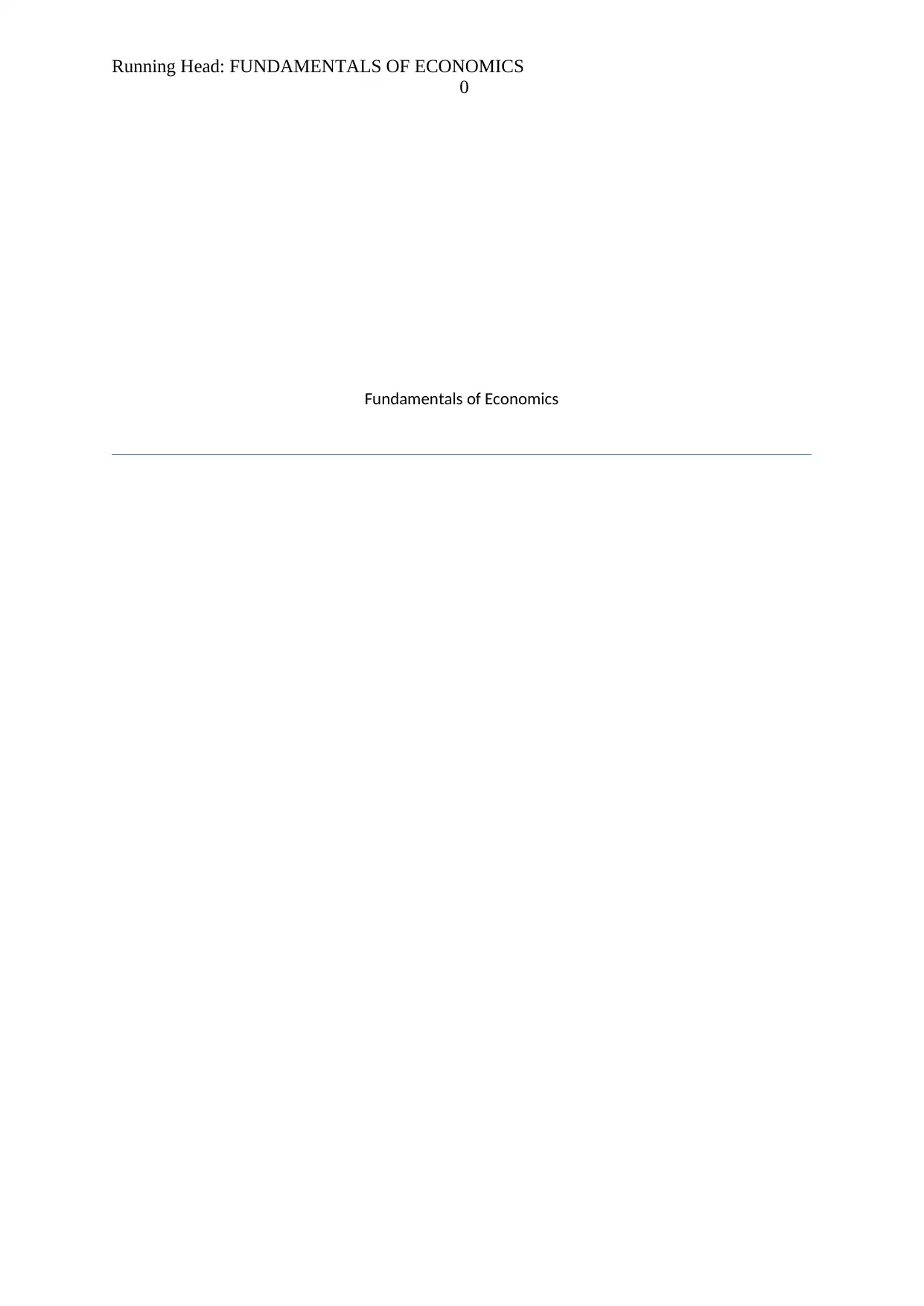
Running Head: FUNDAMENTALS OF ECONOMICS
0
Fundamentals of Economics
0
Fundamentals of Economics
Paraphrase This Document
Need a fresh take? Get an instant paraphrase of this document with our AI Paraphraser
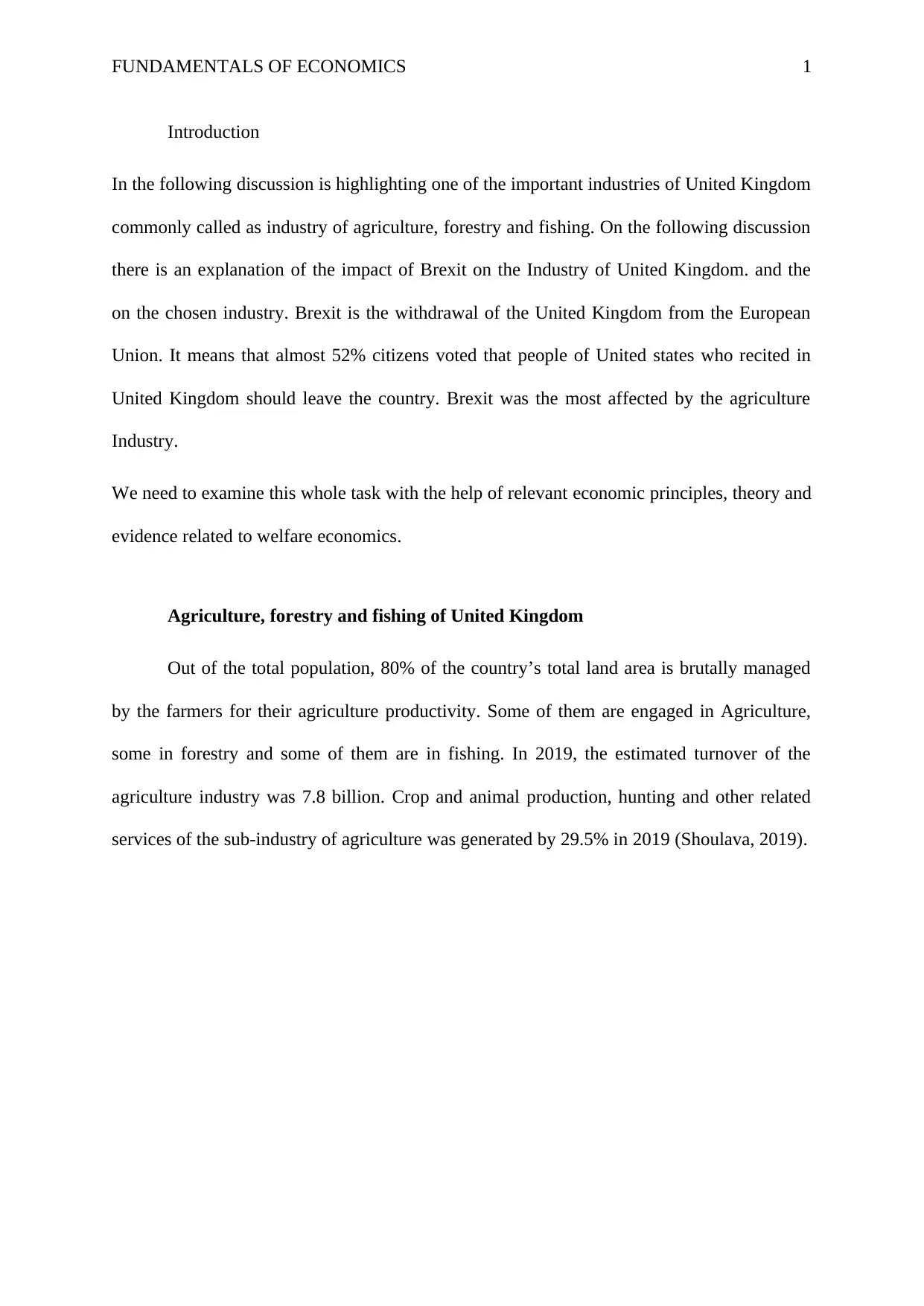
FUNDAMENTALS OF ECONOMICS 1
Introduction
In the following discussion is highlighting one of the important industries of United Kingdom
commonly called as industry of agriculture, forestry and fishing. On the following discussion
there is an explanation of the impact of Brexit on the Industry of United Kingdom. and the
on the chosen industry. Brexit is the withdrawal of the United Kingdom from the European
Union. It means that almost 52% citizens voted that people of United states who recited in
United Kingdom should leave the country. Brexit was the most affected by the agriculture
Industry.
We need to examine this whole task with the help of relevant economic principles, theory and
evidence related to welfare economics.
Agriculture, forestry and fishing of United Kingdom
Out of the total population, 80% of the country’s total land area is brutally managed
by the farmers for their agriculture productivity. Some of them are engaged in Agriculture,
some in forestry and some of them are in fishing. In 2019, the estimated turnover of the
agriculture industry was 7.8 billion. Crop and animal production, hunting and other related
services of the sub-industry of agriculture was generated by 29.5% in 2019 (Shoulava, 2019).
Introduction
In the following discussion is highlighting one of the important industries of United Kingdom
commonly called as industry of agriculture, forestry and fishing. On the following discussion
there is an explanation of the impact of Brexit on the Industry of United Kingdom. and the
on the chosen industry. Brexit is the withdrawal of the United Kingdom from the European
Union. It means that almost 52% citizens voted that people of United states who recited in
United Kingdom should leave the country. Brexit was the most affected by the agriculture
Industry.
We need to examine this whole task with the help of relevant economic principles, theory and
evidence related to welfare economics.
Agriculture, forestry and fishing of United Kingdom
Out of the total population, 80% of the country’s total land area is brutally managed
by the farmers for their agriculture productivity. Some of them are engaged in Agriculture,
some in forestry and some of them are in fishing. In 2019, the estimated turnover of the
agriculture industry was 7.8 billion. Crop and animal production, hunting and other related
services of the sub-industry of agriculture was generated by 29.5% in 2019 (Shoulava, 2019).
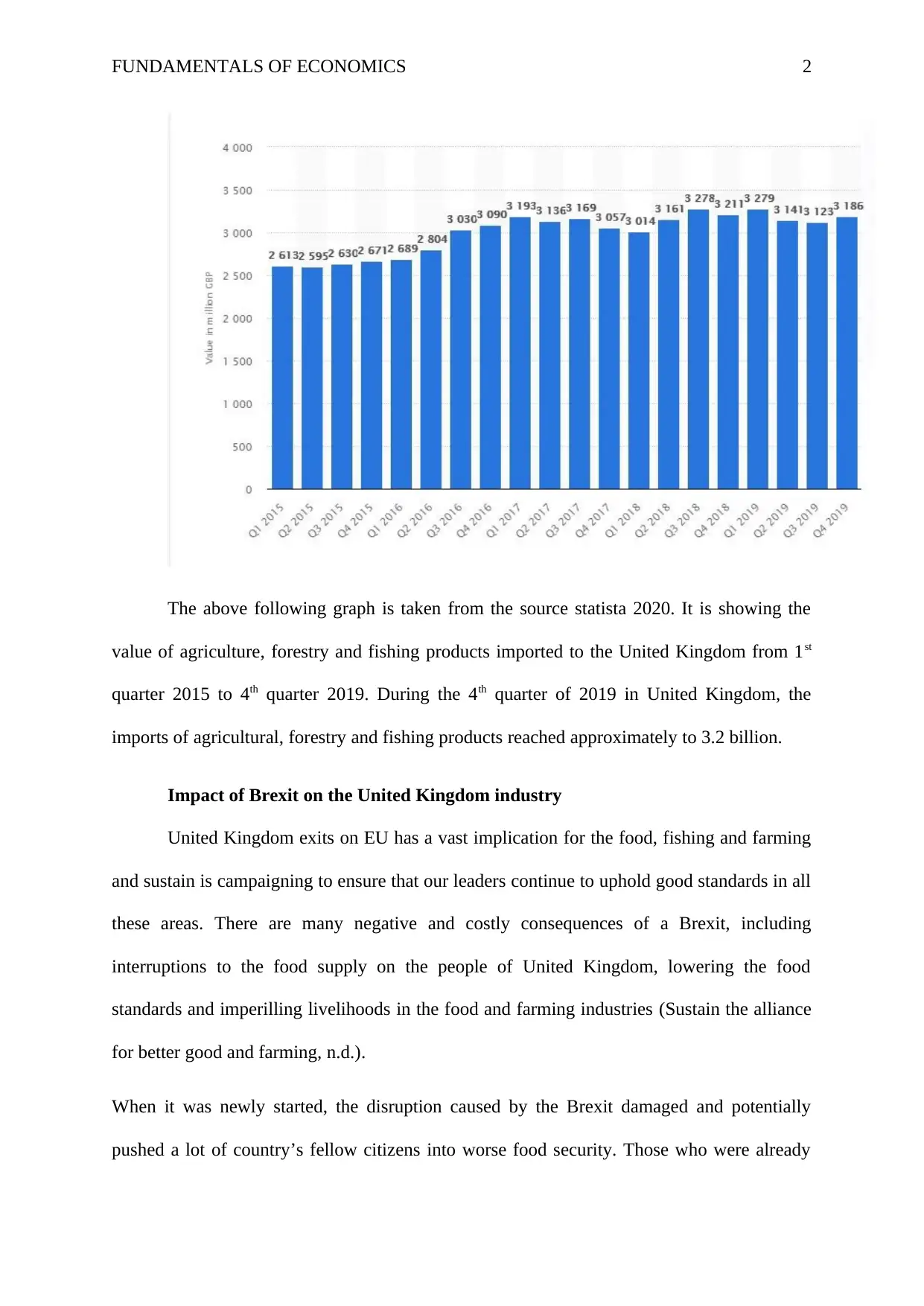
FUNDAMENTALS OF ECONOMICS 2
The above following graph is taken from the source statista 2020. It is showing the
value of agriculture, forestry and fishing products imported to the United Kingdom from 1st
quarter 2015 to 4th quarter 2019. During the 4th quarter of 2019 in United Kingdom, the
imports of agricultural, forestry and fishing products reached approximately to 3.2 billion.
Impact of Brexit on the United Kingdom industry
United Kingdom exits on EU has a vast implication for the food, fishing and farming
and sustain is campaigning to ensure that our leaders continue to uphold good standards in all
these areas. There are many negative and costly consequences of a Brexit, including
interruptions to the food supply on the people of United Kingdom, lowering the food
standards and imperilling livelihoods in the food and farming industries (Sustain the alliance
for better good and farming, n.d.).
When it was newly started, the disruption caused by the Brexit damaged and potentially
pushed a lot of country’s fellow citizens into worse food security. Those who were already
The above following graph is taken from the source statista 2020. It is showing the
value of agriculture, forestry and fishing products imported to the United Kingdom from 1st
quarter 2015 to 4th quarter 2019. During the 4th quarter of 2019 in United Kingdom, the
imports of agricultural, forestry and fishing products reached approximately to 3.2 billion.
Impact of Brexit on the United Kingdom industry
United Kingdom exits on EU has a vast implication for the food, fishing and farming
and sustain is campaigning to ensure that our leaders continue to uphold good standards in all
these areas. There are many negative and costly consequences of a Brexit, including
interruptions to the food supply on the people of United Kingdom, lowering the food
standards and imperilling livelihoods in the food and farming industries (Sustain the alliance
for better good and farming, n.d.).
When it was newly started, the disruption caused by the Brexit damaged and potentially
pushed a lot of country’s fellow citizens into worse food security. Those who were already
⊘ This is a preview!⊘
Do you want full access?
Subscribe today to unlock all pages.

Trusted by 1+ million students worldwide
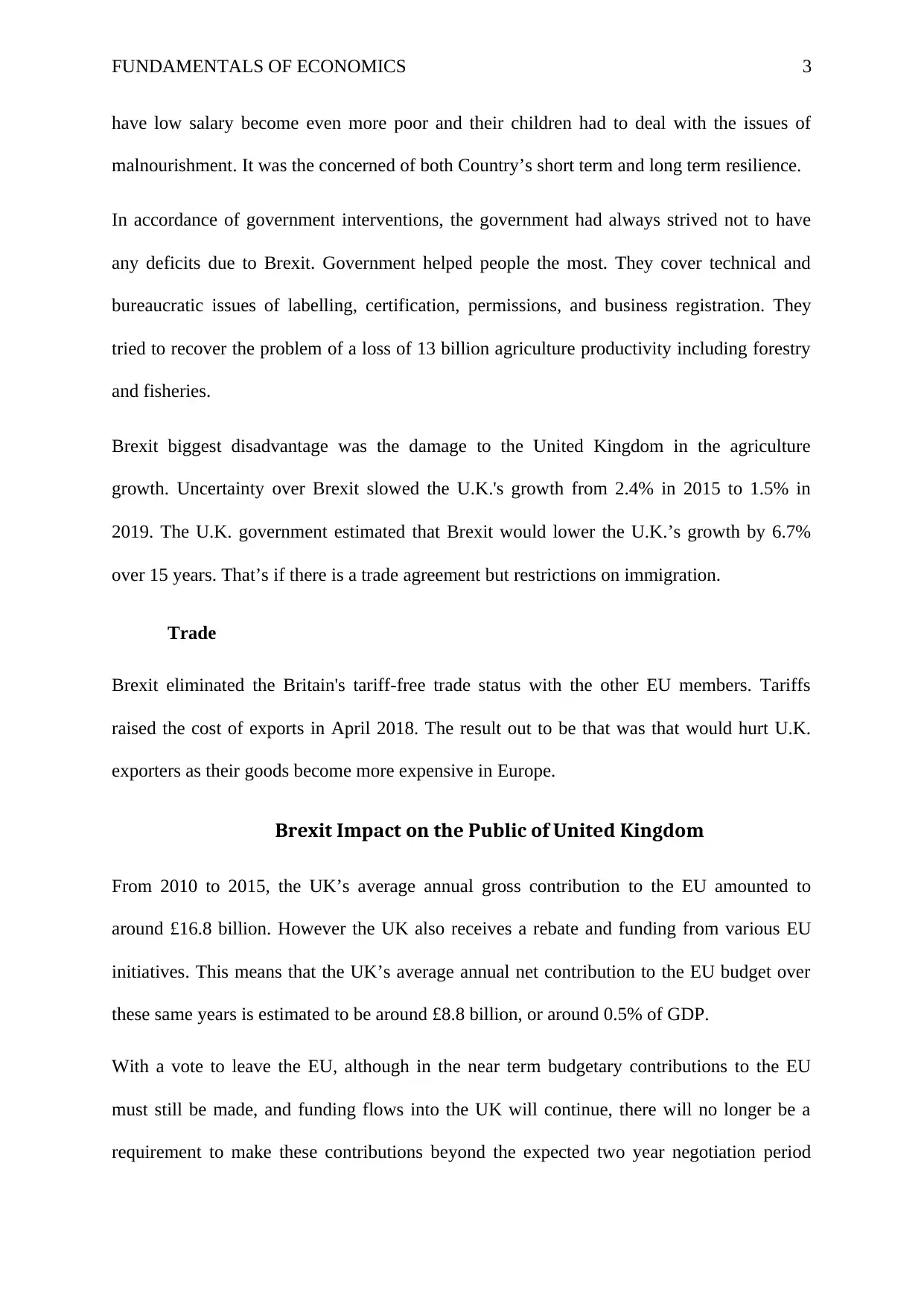
FUNDAMENTALS OF ECONOMICS 3
have low salary become even more poor and their children had to deal with the issues of
malnourishment. It was the concerned of both Country’s short term and long term resilience.
In accordance of government interventions, the government had always strived not to have
any deficits due to Brexit. Government helped people the most. They cover technical and
bureaucratic issues of labelling, certification, permissions, and business registration. They
tried to recover the problem of a loss of 13 billion agriculture productivity including forestry
and fisheries.
Brexit biggest disadvantage was the damage to the United Kingdom in the agriculture
growth. Uncertainty over Brexit slowed the U.K.'s growth from 2.4% in 2015 to 1.5% in
2019. The U.K. government estimated that Brexit would lower the U.K.’s growth by 6.7%
over 15 years. That’s if there is a trade agreement but restrictions on immigration.
Trade
Brexit eliminated the Britain's tariff-free trade status with the other EU members. Tariffs
raised the cost of exports in April 2018. The result out to be that was that would hurt U.K.
exporters as their goods become more expensive in Europe.
Brexit Impact on the Public of United Kingdom
From 2010 to 2015, the UK’s average annual gross contribution to the EU amounted to
around £16.8 billion. However the UK also receives a rebate and funding from various EU
initiatives. This means that the UK’s average annual net contribution to the EU budget over
these same years is estimated to be around £8.8 billion, or around 0.5% of GDP.
With a vote to leave the EU, although in the near term budgetary contributions to the EU
must still be made, and funding flows into the UK will continue, there will no longer be a
requirement to make these contributions beyond the expected two year negotiation period
have low salary become even more poor and their children had to deal with the issues of
malnourishment. It was the concerned of both Country’s short term and long term resilience.
In accordance of government interventions, the government had always strived not to have
any deficits due to Brexit. Government helped people the most. They cover technical and
bureaucratic issues of labelling, certification, permissions, and business registration. They
tried to recover the problem of a loss of 13 billion agriculture productivity including forestry
and fisheries.
Brexit biggest disadvantage was the damage to the United Kingdom in the agriculture
growth. Uncertainty over Brexit slowed the U.K.'s growth from 2.4% in 2015 to 1.5% in
2019. The U.K. government estimated that Brexit would lower the U.K.’s growth by 6.7%
over 15 years. That’s if there is a trade agreement but restrictions on immigration.
Trade
Brexit eliminated the Britain's tariff-free trade status with the other EU members. Tariffs
raised the cost of exports in April 2018. The result out to be that was that would hurt U.K.
exporters as their goods become more expensive in Europe.
Brexit Impact on the Public of United Kingdom
From 2010 to 2015, the UK’s average annual gross contribution to the EU amounted to
around £16.8 billion. However the UK also receives a rebate and funding from various EU
initiatives. This means that the UK’s average annual net contribution to the EU budget over
these same years is estimated to be around £8.8 billion, or around 0.5% of GDP.
With a vote to leave the EU, although in the near term budgetary contributions to the EU
must still be made, and funding flows into the UK will continue, there will no longer be a
requirement to make these contributions beyond the expected two year negotiation period
Paraphrase This Document
Need a fresh take? Get an instant paraphrase of this document with our AI Paraphraser
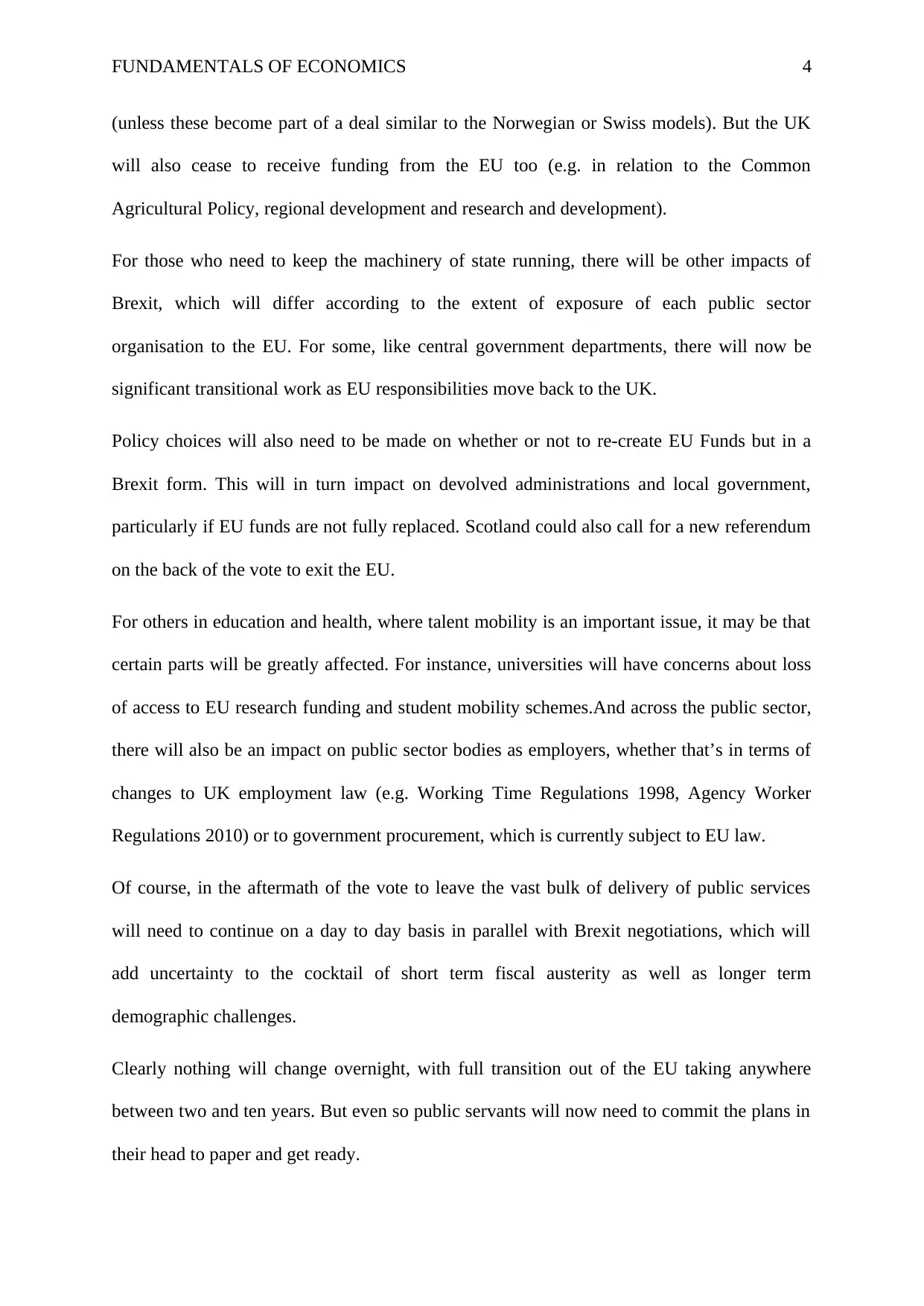
FUNDAMENTALS OF ECONOMICS 4
(unless these become part of a deal similar to the Norwegian or Swiss models). But the UK
will also cease to receive funding from the EU too (e.g. in relation to the Common
Agricultural Policy, regional development and research and development).
For those who need to keep the machinery of state running, there will be other impacts of
Brexit, which will differ according to the extent of exposure of each public sector
organisation to the EU. For some, like central government departments, there will now be
significant transitional work as EU responsibilities move back to the UK.
Policy choices will also need to be made on whether or not to re-create EU Funds but in a
Brexit form. This will in turn impact on devolved administrations and local government,
particularly if EU funds are not fully replaced. Scotland could also call for a new referendum
on the back of the vote to exit the EU.
For others in education and health, where talent mobility is an important issue, it may be that
certain parts will be greatly affected. For instance, universities will have concerns about loss
of access to EU research funding and student mobility schemes.And across the public sector,
there will also be an impact on public sector bodies as employers, whether that’s in terms of
changes to UK employment law (e.g. Working Time Regulations 1998, Agency Worker
Regulations 2010) or to government procurement, which is currently subject to EU law.
Of course, in the aftermath of the vote to leave the vast bulk of delivery of public services
will need to continue on a day to day basis in parallel with Brexit negotiations, which will
add uncertainty to the cocktail of short term fiscal austerity as well as longer term
demographic challenges.
Clearly nothing will change overnight, with full transition out of the EU taking anywhere
between two and ten years. But even so public servants will now need to commit the plans in
their head to paper and get ready.
(unless these become part of a deal similar to the Norwegian or Swiss models). But the UK
will also cease to receive funding from the EU too (e.g. in relation to the Common
Agricultural Policy, regional development and research and development).
For those who need to keep the machinery of state running, there will be other impacts of
Brexit, which will differ according to the extent of exposure of each public sector
organisation to the EU. For some, like central government departments, there will now be
significant transitional work as EU responsibilities move back to the UK.
Policy choices will also need to be made on whether or not to re-create EU Funds but in a
Brexit form. This will in turn impact on devolved administrations and local government,
particularly if EU funds are not fully replaced. Scotland could also call for a new referendum
on the back of the vote to exit the EU.
For others in education and health, where talent mobility is an important issue, it may be that
certain parts will be greatly affected. For instance, universities will have concerns about loss
of access to EU research funding and student mobility schemes.And across the public sector,
there will also be an impact on public sector bodies as employers, whether that’s in terms of
changes to UK employment law (e.g. Working Time Regulations 1998, Agency Worker
Regulations 2010) or to government procurement, which is currently subject to EU law.
Of course, in the aftermath of the vote to leave the vast bulk of delivery of public services
will need to continue on a day to day basis in parallel with Brexit negotiations, which will
add uncertainty to the cocktail of short term fiscal austerity as well as longer term
demographic challenges.
Clearly nothing will change overnight, with full transition out of the EU taking anywhere
between two and ten years. But even so public servants will now need to commit the plans in
their head to paper and get ready.
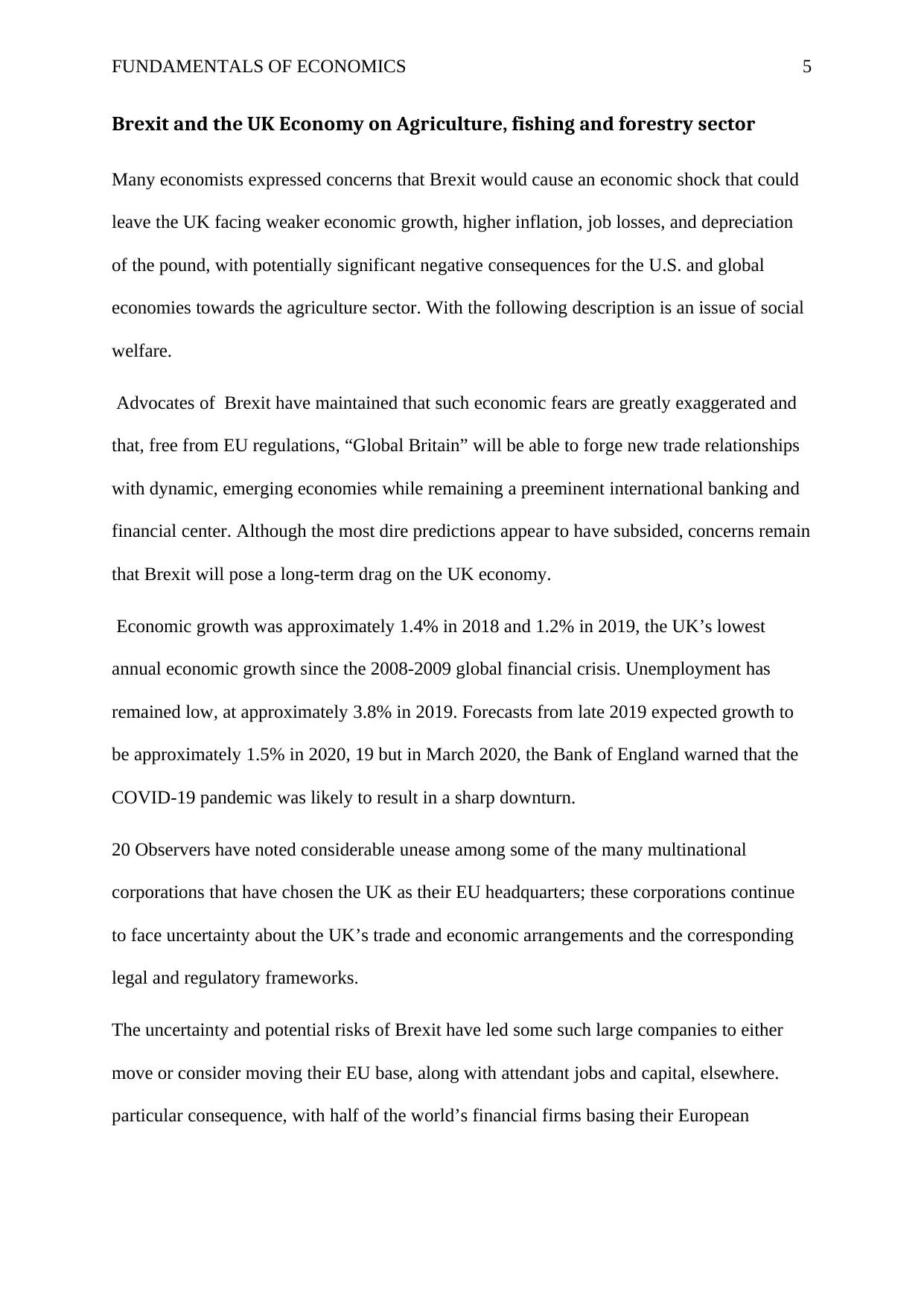
FUNDAMENTALS OF ECONOMICS 5
Brexit and the UK Economy on Agriculture, fishing and forestry sector
Many economists expressed concerns that Brexit would cause an economic shock that could
leave the UK facing weaker economic growth, higher inflation, job losses, and depreciation
of the pound, with potentially significant negative consequences for the U.S. and global
economies towards the agriculture sector. With the following description is an issue of social
welfare.
Advocates of Brexit have maintained that such economic fears are greatly exaggerated and
that, free from EU regulations, “Global Britain” will be able to forge new trade relationships
with dynamic, emerging economies while remaining a preeminent international banking and
financial center. Although the most dire predictions appear to have subsided, concerns remain
that Brexit will pose a long-term drag on the UK economy.
Economic growth was approximately 1.4% in 2018 and 1.2% in 2019, the UK’s lowest
annual economic growth since the 2008-2009 global financial crisis. Unemployment has
remained low, at approximately 3.8% in 2019. Forecasts from late 2019 expected growth to
be approximately 1.5% in 2020, 19 but in March 2020, the Bank of England warned that the
COVID-19 pandemic was likely to result in a sharp downturn.
20 Observers have noted considerable unease among some of the many multinational
corporations that have chosen the UK as their EU headquarters; these corporations continue
to face uncertainty about the UK’s trade and economic arrangements and the corresponding
legal and regulatory frameworks.
The uncertainty and potential risks of Brexit have led some such large companies to either
move or consider moving their EU base, along with attendant jobs and capital, elsewhere.
particular consequence, with half of the world’s financial firms basing their European
Brexit and the UK Economy on Agriculture, fishing and forestry sector
Many economists expressed concerns that Brexit would cause an economic shock that could
leave the UK facing weaker economic growth, higher inflation, job losses, and depreciation
of the pound, with potentially significant negative consequences for the U.S. and global
economies towards the agriculture sector. With the following description is an issue of social
welfare.
Advocates of Brexit have maintained that such economic fears are greatly exaggerated and
that, free from EU regulations, “Global Britain” will be able to forge new trade relationships
with dynamic, emerging economies while remaining a preeminent international banking and
financial center. Although the most dire predictions appear to have subsided, concerns remain
that Brexit will pose a long-term drag on the UK economy.
Economic growth was approximately 1.4% in 2018 and 1.2% in 2019, the UK’s lowest
annual economic growth since the 2008-2009 global financial crisis. Unemployment has
remained low, at approximately 3.8% in 2019. Forecasts from late 2019 expected growth to
be approximately 1.5% in 2020, 19 but in March 2020, the Bank of England warned that the
COVID-19 pandemic was likely to result in a sharp downturn.
20 Observers have noted considerable unease among some of the many multinational
corporations that have chosen the UK as their EU headquarters; these corporations continue
to face uncertainty about the UK’s trade and economic arrangements and the corresponding
legal and regulatory frameworks.
The uncertainty and potential risks of Brexit have led some such large companies to either
move or consider moving their EU base, along with attendant jobs and capital, elsewhere.
particular consequence, with half of the world’s financial firms basing their European
⊘ This is a preview!⊘
Do you want full access?
Subscribe today to unlock all pages.

Trusted by 1+ million students worldwide

FUNDAMENTALS OF ECONOMICS 6
headquarters in London and employing one million people, is the loss of the UK’s EU “pass
porting” rights.
One of the economic theory of welfare economics state that
headquarters in London and employing one million people, is the loss of the UK’s EU “pass
porting” rights.
One of the economic theory of welfare economics state that
Paraphrase This Document
Need a fresh take? Get an instant paraphrase of this document with our AI Paraphraser

FUNDAMENTALS OF ECONOMICS 7
Bibliography
Shoulava, E., 2019. Agriculture, Forestry & Fishing in the UK 2019. [Online] Available at:
https://www.statista.com/study/42044/agriculture-forestry-and-fishing-in-the-uk/.
Sustain the alliance for better good and farming, n.d. What will be the impact of Brexit on
food and farming? [Online] Available at: https://www.sustainweb.org/brexit/.
Bibliography
Shoulava, E., 2019. Agriculture, Forestry & Fishing in the UK 2019. [Online] Available at:
https://www.statista.com/study/42044/agriculture-forestry-and-fishing-in-the-uk/.
Sustain the alliance for better good and farming, n.d. What will be the impact of Brexit on
food and farming? [Online] Available at: https://www.sustainweb.org/brexit/.
1 out of 8
Related Documents
Your All-in-One AI-Powered Toolkit for Academic Success.
+13062052269
info@desklib.com
Available 24*7 on WhatsApp / Email
![[object Object]](/_next/static/media/star-bottom.7253800d.svg)
Unlock your academic potential
Copyright © 2020–2025 A2Z Services. All Rights Reserved. Developed and managed by ZUCOL.





